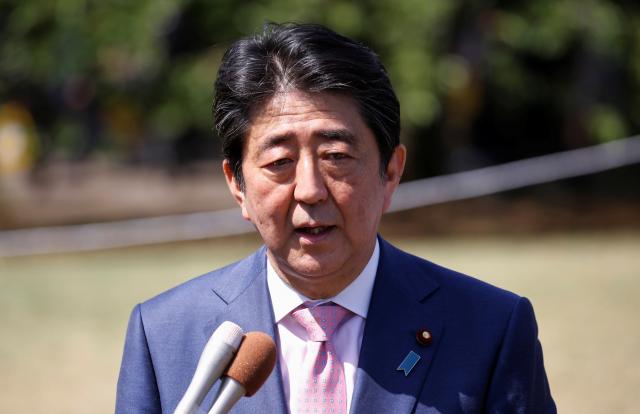Abe’s victory – taking 553 votes out of a total of 807 – means he is assured of continuing as prime minister and is expected to use his mandate to push ahead with controversial plans to strengthen the legal status of Japan’s military, known as the self-defence forces.
Speaking on the eve of the vote among LDP MPs and party members, Abe said he was determined to “build a new country together”, adding: “I promise to take the lead in handing over a proud and hopeful Japan to younger generations.”
Abe, a conservative who has devoted his political career to loosening the postwar shackles on the self-defence forces, easily beat his nearest rival, former defence minister Shigeru Ishiba, who had voiced concern that the country had not been given enough time to debate constitutional reform.
Abe’s victory on Thursday effectively extends his term in office by another three years. If he is still in office in November 2019 he will overtake Taro Katsura, who was leader for 2,886 days – spread over three terms – in the early 1900s.
Abe, who has survived two cronyism scandals, spent a tumultuous year in office from late 2006, but has not lost an election since he became prime minister for a second time in December 2012.
He has quietly dropped plans for a comprehensive revision to the war-renouncing clause in the constitution, insisting he simply wants to confirm the legality of the self-defence forces, which are not recognised by the current document.
He has also said he would retain passages that forbid Japan from waging a war of aggression.
Article 9 of the current constitution, authored by US occupation forces at the end of the second world war, renounces war and forbids the use of force to settle international disputes.
Abe, however, redefined the military’s role three years age with the passage of a law allowing it to take part in collective-self defence. In theory, that means Japanese troops could come to the aid of an ally under attack even if its own territory is not threatened.
The constitutional change would require a two-thirds majority in both houses of the Japanese Diet and a simple majority in a national referendum.
Any move to strengthen the military’s status could damage Abe’s standing, however, particularly among older voters who have formed an emotional attachment to their country’s postwar pacifism.
According to a poll by public broadcaster NHK earlier this year, 31% of respondents agreed with Abe’s proposal, while 23% opposed it and 40% were undecided.
The change could also test Tokyo’s relationship with South Korea and China, both victims of Japanese militarism in the first half of the 20th century.
Analysts pointed out that most voters were more concerned about the economy and population decline.
“They simply do not see revision as a top priority for the government and Diet,” said Tobias Harris, a Japan expert at Teneo Intelligence in Washington, adding that constitutional revision was a “costly distraction that could trigger a backlash vote”.
More about: #Japan
















































